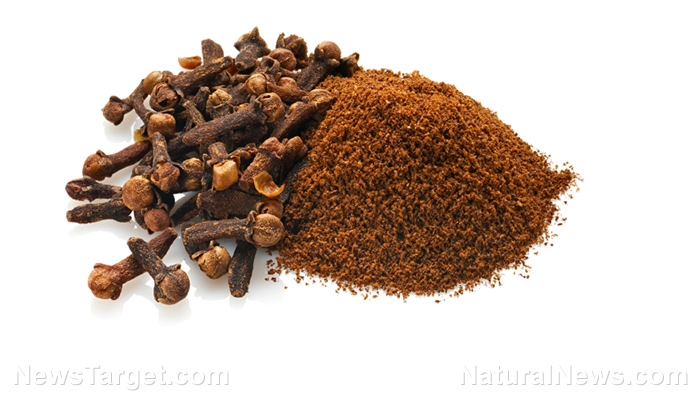Study: Clove extract may help improve blood sugar control and prevent diabetes
01/28/2021 / By Virgilio Marin

Cloves are the aromatic buds of the evergreen tree, Syzygium aromaticum. This potent spice is found in both whole and ground forms and is a versatile food ingredient used for seasoning pot roasts and adding flavor to hot beverages and desserts. In Ayurveda and Traditional Chinese Medicine, clove is used to treat influenza, cough, digestive problems, toothache, nausea and vomiting, among other things.
Research also shows that cloves may help lower blood sugar levels and prevent diabetes. In a recent study published in BMC Complementary and Alternative Medicine, American and Indian researchers found that clove extract helps improve blood sugar control and prevent the progression of prediabetes to Type 2 diabetes.
Clove extract helps reduce blood sugar levels
The researchers examined the effect of 250 milligrams of polyphenol-rich clove extract on 13 adults with either normal fasting glucose or prediabetic fasting glucose levels. For 30 days, the participants took the clove supplement after meals, and the researchers measured their blood sugar levels two hours after intake as well as eight hours before eating their meals.
The researchers found that the post-meal blood sugar levels of both groups significantly decreased starting Day 12 of supplementation until the end of the study (Day 30). The prediabetic group had 27 percent lower glucose levels compared to baseline, while the healthy group had 21 percent lower glucose levels. The clove extract also reduced the prediabetic participants’ fasting glucose levels at Days 24 and 30.
The team also examined the polyphenol-rich clove extract’s mechanism of action in in vitro experiments. They found that the extract enhanced the ability of L6 myocytes (muscle cells) to take up sugar from the blood. The extract also inhibited glucose production in liver cells as well as the activities of alpha-amylase and alpha-glucosidase. These enzymes are involved in the digestion of carbohydrates and implicated in the rise of blood sugar levels.
The researchers concluded that polyphenol-rich clove extract can help maintain healthy glucose metabolism, especially in people with prediabetes.
More studies on the anti-diabetic benefits of cloves
Other studies have shown that cloves boost the secretion of insulin, a hormone that signals cells to absorb glucose from the blood. In a 2017 study, researchers looked into the effects of clove extract and nigricin, a compound found in cloves, on human muscle cells and diabetic mice. The researchers found that the extract and nigricin increased insulin secretion and glucose uptake and improved the function of cells that produce insulin.
In a 2006 study, researchers found that clove extract improved insulin function and lowered blood glucose levels in people with Type 2 diabetes. They also found that the extract reduced low-density lipoprotein (LDL) cholesterol levels. High LDL cholesterol levels can cause plaque buildup in the arteries and lead to cardiovascular disease and heart attack.
Studies also show that clove can improve liver function, which is important for blood sugar control. In a 2014 study, researchers fed water-based microemulsions of either clove essential oil or its major constituent, eugenol, to rats with fatty liver disease. Both mixtures improved liver function, reduced inflammation and lowered oxidative stress in the mice. (Related: Clove buds reduce inflammation caused by excessive drinking.)
Cloves are rich in antioxidants that can help fight oxidative stress and prevent liver disease. In fact, cloves contain 30 times more antioxidants than blueberries, which are known to have one of the highest antioxidant levels of all fruits.
Clove extracts are available in tablets, tinctures and powders. Make clove tea by boiling a teaspoon of powdered cloves for eight to 10 minutes. Add cinnamon and cardamom for added benefit.
Read more articles about anti-diabetic foods at DiabetesCure.news.
Sources include:
BMCComplementaryMedTherapies.BioMedCentral.com
Submit a correction >>
Tagged Under:
alternative medicine, anti-diabetes, Cloves, disease treatments, food cures, food is medicine, functional food, herbal medicine, Herbs, natural cures, natural medicine, Prediabetes, prevent diabetes, research
This article may contain statements that reflect the opinion of the author
RECENT NEWS & ARTICLES
FoodIsMedicine.com is a fact-based public education website published by Food Is Medicine Features, LLC.
All content copyright © 2018 by Food Is Medicine Features, LLC.
Contact Us with Tips or Corrections
All trademarks, registered trademarks and servicemarks mentioned on this site are the property of their respective owners.





















